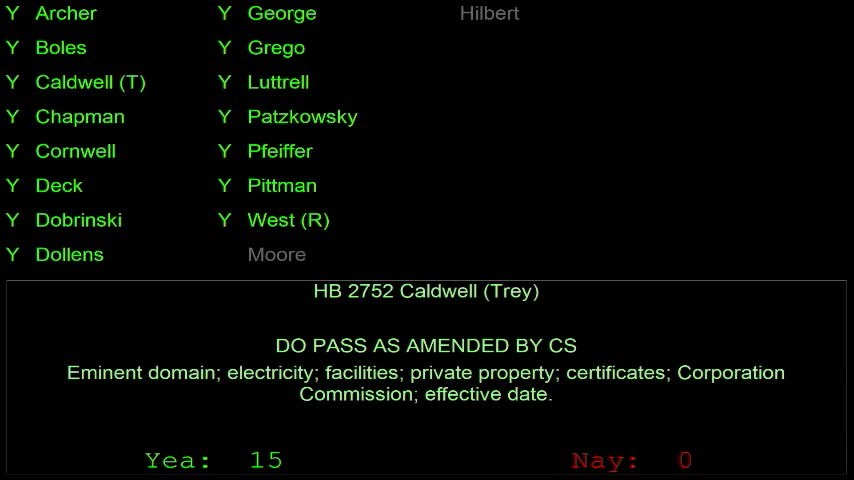Energy and Natural Resources Oversight Committee: votes at a glance on 18 bills
Get AI-powered insights, summaries, and transcripts
Subscribe
Summary
The committee considered 18 bills covering water training contracts, horse racing rules, meat labeling, renewable energy permitting, transmission projects, and oil and gas financial assurance. Most bills were reported as "do pass." Several items prompted debate, including a meat-labeling bill and a renewable-permitting proposal.
The Energy and Natural Resources Oversight Committee met and considered 18 bills spanning water training contracts, horse racing representation, meat labeling, renewable energy permitting, transmission siting, and oil-and-gas financial assurance. Committee members voted to report most bills as "do pass," with recorded tallies and several notable debates recorded on the meat-labeling and renewable-permitting bills.
The meeting began with House Bill 18 13, a clarification allowing the Oklahoma Water Resources Board to work with an existing Oklahoma nonprofit (the Oklahoma Rural Water Association) or another Oklahoma-based nonprofit for training. Representative Newton presented the bill and the committee recorded a vote of 12 ayes, 0 nays; the measure was reported as due pass.
Other bills that were reported as due pass with little or no debate included a repeal bill (House Bill 2,073; 12 ayes, 0 nays), an update to the Bureau of Standards language (House Bill 15 42; 15 ayes, 0 nays), and multiple bills related to pipelines and road grading (House Bill 16 66; 14 ayes, 0 nays). A bill asking the Oklahoma Corporation Commission to submit an annual report about Southwest Power Pool activities (House Bill 16 62) passed 15 ayes, 0 nays.
Representative Grego’s meat-labeling bill (House Bill 11 26) drew extended debate over scope and constitutional concerns; the committee voted to report that bill as due pass with a tally of 12 ayes, 3 nays.
A permitting proposal for new renewable generation projects (House Bill 21 55) — which would require a permitting process through the Oklahoma Corporation Commission and authorize fees tied to project size — was discussed at length. The committee reported that bill as due pass with a recorded vote of 13 ayes, 2 nays.
Two related bills about transmission and eminent-domain issues advanced. House Bill 27 52, which language prohibits eminent domain for economic development related to energy projects, passed 15 ayes, 0 nays. House Bill 27 56, described by the author as a "transmission developer act" establishing notification processes for adjacent landowners and county officials, passed as due pass with a tally of 12 ayes, 3 nays.
A package of oil- and gas-related measures was reported as due pass: House Bill 13 69 (tiered surety changes for plugging wells) passed 14 ayes, 1 nay; House Bill 13 70 (increasing funds to plug wells and aiming to increase annual plugging capacity) passed 14 ayes, 1 nay; House Bill 13 73 (adding decommissioning protections for landowners with solar facilities) passed 14 ayes, 0 nays; and House Bill 13 75 (commission study to evaluate risks and opportunities, including for nuclear and other generation technologies) passed 13 ayes, 1 nay.
Several items were laid over or postponed for a later meeting slot.
Votes at a glance (selected bills with outcomes): - HB 18 13 — due pass; 12 ayes, 0 nays. - HB 10 89 — presented; motion to do pass (final roll not printed in transcript). - HB 2,073 — due pass; 12 ayes, 0 nays. - HB 11 26 (meat labeling) — due pass; 12 ayes, 3 nays. - HB 16 62 (OCC report on Southwest Power Pool) — due pass; 15 ayes, 0 nays. - HB 16 66 (county road grading/pipelines maintenance) — due pass; 14 ayes, 0 nays. - HB 20 96 (wildlife refund donation reauthorization) — due pass (tally not printed in transcript excerpt). - HB 15 42 (Bureau of Standards language) — due pass; 15 ayes, 0 nays. - HB 2,037 (statutory repeals) — due pass; 15 ayes, 0 nays. - HB 20 43 (Energy Discrimination Act update) — due pass; 13 ayes, 1 nay. - HB 21 55 (renewable permitting through OCC) — due pass; 13 ayes, 2 nays. - HB 27 52 (limits on eminent domain for economic development) — due pass; 15 ayes, 0 nays. - HB 27 56 (transmission developer/notification) — due pass; 12 ayes, 3 nays. - HB 13 69 (tiered surety for wells) — due pass; 14 ayes, 1 nay. - HB 13 70 (increase plugging fund / plug more wells) — due pass; 14 ayes, 1 nay. - HB 13 73 (solar decommissioning protections) — due pass; 14 ayes, 0 nays. - HB 13 75 (OCC study on industry risks/opportunities) — due pass; 13 ayes, 1 nay.
Where the transcript did not record a full roll call or specific second, the committee’s outcomes above reflect the tallies spoken on the record. Several bills had additional clarifying discussion recorded in committee; those with substantial debate are covered in separate detailed articles.
